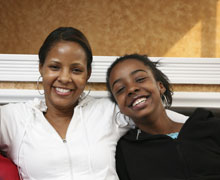
Teens crave freedom. Parents treasure time together. Balancing the two is one of the biggest challenges families face when children 15-18 begin the final countdown to adulthood.
“Teens definitely want separation from their parents — and even from our staff,” says Sara Biancofiori, Senior Youth Development director at the Bellevue Family YMCA.
That may be why it’s hard to find activities designed specifically for teens and parents to enjoy together. But the situation isn’t hopeless. Consider the wealth of “mass audience” classes — everything from yoga to photography to CPR — offered by various organizations throughout the area. Even if they’re not aimed at parents-and-teen pairs, many lend themselves well to family participation.
“Many of our classes are open to that,” says Biancofiori. “I don’t know if it registers with parents that they can bring their teen [to an adult class]. It’s a good opportunity to do something active with their child.”
Too cool for school?
The key is to find a class that turns the teen on without turning off — or maxing out — the parent. “As an adult, you don’t want to get into a position where you have to back out because you physically can’t do something,” says Jennifer Stoakes, a Seattle psychotherapist who frequently works with parents. Stoakes is also an instructor at Two Cranes Aikido. Aikido is a family-friendly martial art that develops strength and agility, heightens concentration and encourages relaxation.
“It seems like we’re getting more father-and-son pairs taking classes together rather than the teen taking a teen class and the adult taking an adult class,” says Stoakes. That’s a healthy trend, she says, because taking a class with their teenager — especially if it supports a parental priority — gives parents an opportunity to be a role model. “You hear kids say to their parents all the time, ‘You’re such a hypocrite,’” says Stoakes. “They watch carefully to see if parents are walking the talk.”
Taking a class together also gives parents a conversation starter that doesn’t require teens to talk about themselves — always a touchy topic. “We tend to overfocus on the child at a time when they need to develop their identity,” says Stoakes. The dialogue about a class on the ride home gives parents something to ask teens about besides, “How are you doing?”
Biancofiori says that while choosing an activity that excites a teen is critical, this question trumps all: “Does the teen really want to do something with mom and dad?”
Her solution: Arrange for other teens and parents to participate as well. “If [teens] know other families are doing it, they’ll feel a lot more comfortable than if they were the only ones,” she says.
Parents should also seize random chances to interact, which could pave the way to take a class together somewhere down the road, says Biancofiori. Witness the behavior of parents who come to pick up their children from the drop-in program at the Bellevue Y.
“Some parents are very playful and come in and spend some time, and others just sit outside and honk the horn,” she says. “There are definitely kids who want to be without their parents, but there are others who want their parents to be around.”
Finding a fit
If a teen rebels against taking a class, it could be because their parents haven’t found one related to their child’s interests, Stoakes says. Parents can address that by observing their teen’s leisure choices and then surfing the Web sites of their local parks departments, community colleges and other organizations for classes that fit.
For example, what teen isn’t fascinated by the Internet? And what parent isn’t suspicious that their teen knows more than they do? Seattle and King County public libraries (www.spl.org; www.kcls.org) offer numerous Internet and computer classes that families can take together. One recent class title that falls into this category: “Blogs, Wikis and Podcasts.”
The Seattle Sail and Power Squadron (www.usps.org/localusps/seattle) offers boating safety classes. “We get quite a few families who take the classes together,” said Pete Weigel, assistant education officer. Graduates qualify for a Washington boater education card, which is being phased in as a requirement to operate a boat in this state.
The Seattle Language Academy (www.sealang.com) offers instruction in a dozen languages. Although membership may be required, The Mountaineers (www.mountaineers.org) sponsor a host of outdoor recreational classes ranging from first aid to navigation to climbing. The Experience Music Project (www.empsfm.org) offers music lessons for all ages. The Bellevue Youth Theatre (www.bytf.org) involves entire families in its productions.
The most eclectic collection of classes is available through the University of Washington Experimental College (www.washington.edu). Founded in 1968 by UW students, the Experimental College offers nontraditional classes — many open to teens as well as adults — in more than 20 categories. The most recent online catalog included classes in basic digital photography, beginning hip-hop and skeptical ghost hunting. Cool!
Brad Broberg is a freelance writer and former newspaper reporter/editor who lives in Federal Way with his 12-year-old daughter, Rachel.











